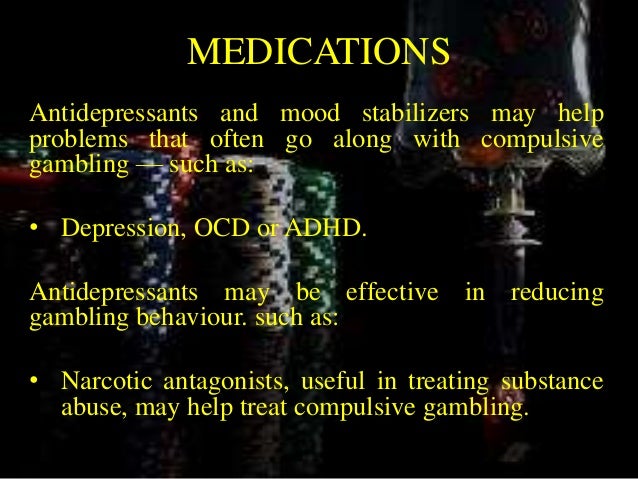- Cognitive-behavioural Therapy And Problem Gambling
- Cognitive Behavioural Therapy
- Cognitive Behavioural Therapy Gambling Addiction
- Cognitive Behavioural Therapy Pdf
- Cognitive Behavioral Therapy Steps
- Cognitive Behavioural Therapy Gambling Disorders
The potential utility of SBIRT protocols to mitigate the negative consequences associated with behavioural addictions such as problem gambling has yet to receive much empirical attention; however, there has been increasing investigation of the potential public health impact of such an approach in those with problem gambling (e.g., NCT03287583). CBT (cognitive behavioural therapy) is one of the most common treatments for a range of mental health problems, from anxiety, depression, bipolar, OCD or sch. How does routinely delivered cognitive-behavioural therapy for gambling disorder compare to 'gold standard' clinical trial? Smith DP(1), Fairweather-Schmidt AK(1), Harvey PW(1)(2), Battersby MW(1). Author information: (1)Flinders Human Behaviour and Health Research Unit. The role of subjective mood states in the maintenence of gambling behaviour, Journal of Gambling Studies, 11, 123-135. Adolescent gambling. The current study aimed to test the clinical effectiveness of a cognitive-behavioural program (CBT) specifically adapted for pathological gamblers with chronic schizophrenia, carried out in a naturalistic setting of community Mental Health Centres. (control group) or to cognitive-behavioural therapy for pathological gambling plus a standard.
How CBT can help with problems with Gambling
Gambling in itself, like a day at the races, playing the lottery is not problematic. Gambling, just like drinking alcohol only becomes problematic when the person is doing it at the expense of other commitments like work and family. People who are problem gamblers can’t control their impulses to gamble.
You may well have a problem with gambling if you
- have a preoccupation with gambling e.g. thinking of ways to get money to gamble or strategies to win.
- Are gambling with increasing amounts of money in order to achieve the desired excitement.
- Have made repeated unsuccessful efforts to control or stop gambling
- If you get restless or irritable when attempting to control or stop gambling.
- Are gambling to escape from problems.
- If you are continuing to gamble despite losses in an effort to recoup money lost.
- If you are lying to others to hide gambling behaviours or consequences of gambling (e.g. lost money).
- If you are committing illegal acts (e.g. theft) to finance gambling or gambling debt.
- If you are risking or losing significant opportunities (e.g. relationships and jobs) due to gambling.
- If you are borrowing money to finance gambling or gambling debts.
As with all addictions, the severity of the problem varies from person to person, and there’s no set pattern for when addicts gamble (daily vs. weekly) or the medium they use. Some research suggests that men tend to prefer sports betting and competitive skill-based games, while women are more likely to play the slot machines or bingo.
As with all addictions, one of the first steps on the road to recovery is admitting there’s something wrong in the first place. The percentage of gambling addicts who seek out treatment is small (some estimates are as low as 3%), most addicts don’t get help until very late in the cycle.

Acknowledging a gambling problem takes considerable courage, strength and desire in order to rectify the financial and emotional damage that gambling has caused. Recovering from gambling addiction is not easy, but it may be easier with the support of a trained therapist who can offer counselling for gambling.
Cognitive Behavioural Therapy (CBT) is used to treat gambling by focusing on different ways of thinking and also addresses how your feelings and behaviours when you want to gamble. If appropriate, CBT will also look at your current life situation to explore the root of the problem.
Research has shown that CBT can:
- reduce the number of days a person gambles
- reduce the amount of money they lose
- Help a gambler to stay away from gambling once they have stopped.
How does CBT work?
If you are a problem gambler, you will think differently from other people about your betting. You will tend to believe that:
- you are more likely to win than you would expect by chance
- in a game with random numbers, like roulette, certain numbers are more likely to come up than others
- winning twice in a row means that you are on a ‘winning streak’ – so you bet larger and larger sums
- you are more likely to win at a game of chance if you are familiar with it
- certain rituals can bring you luck
- Having lost, you can somehow win back your losses by gambling more.
CBT is given in approximately 10-12 one-hour sessions. The sessions focus on these ways of thinking, but also on how you feel and behave when you want to bet or when you are gambling. CBT helps you to work out more helpful ways of thinking and behaving. A diary helps you to keep track of your improvement.
Research suggests that Cognitive Behaviour Therapy is effective in decreasing the negative consequences of pathological gambling.
Cognitive behavioural therapy (CBT) is a talking therapy that can help you manage your problems by changing the way you think and behave.
It's most commonly used to treat anxiety and depression, but can be useful for other mental and physical health problems.
How CBT works

CBT is based on the concept that your thoughts, feelings, physical sensations and actions are interconnected, and that negative thoughts and feelings can trap you in a vicious cycle.
CBT aims to help you deal with overwhelming problems in a more positive way by breaking them down into smaller parts.
You're shown how to change these negative patterns to improve the way you feel.
Unlike some other talking treatments, CBT deals with your current problems, rather than focusing on issues from your past.
It looks for practical ways to improve your state of mind on a daily basis.
Uses for CBT
CBT has been shown to be an effective way of treating a number of different mental health conditions.
In addition to depression or anxiety disorders, CBT can also help people with:
- eating disorders – such as anorexia and bulimia
- obsessive compulsive disorder (OCD)
- post-traumatic stress disorder (PTSD)
- sleep problems – such as insomnia
- problems related to alcohol misuse
CBT is also sometimes used to treat people with long-term health conditions, such as:
- irritable bowel syndrome (IBS)
- chronic fatigue syndrome (CFS)
Although CBT cannot cure the physical symptoms of these conditions, it can help people cope better with their symptoms.
What happens during CBT sessions
If CBT is recommended, you'll usually have a session with a therapist once a week or once every 2 weeks.
The course of treatment usually lasts for between 5 and 20 sessions, with each session lasting 30 to 60 minutes.
Cognitive-behavioural Therapy And Problem Gambling
During the sessions, you'll work with your therapist to break down your problems into their separate parts, such as your thoughts, physical feelings and actions.
You and your therapist will analyse these areas to work out if they're unrealistic or unhelpful, and to determine the effect they have on each other and on you.
Your therapist will then be able to help you work out how to change unhelpful thoughts and behaviours.
After working out what you can change, your therapist will ask you to practise these changes in your daily life and you'll discuss how you got on during the next session.
Cognitive Behavioural Therapy
.jpg)
The eventual aim of therapy is to teach you to apply the skills you have learnt during treatment to your daily life.
This should help you manage your problems and stop them having a negative impact on your life, even after your course of treatment finishes.

Pros and cons of CBT
Cognitive behavioural therapy (CBT) can be as effective as medicine in treating some mental health problems, but it may not be successful or suitable for everyone.
Some of the advantages of CBT include:
- it may be helpful in cases where medicine alone has not worked
- it can be completed in a relatively short period of time compared with other talking therapies
- the highly structured nature of CBT means it can be provided in different formats, including in groups, self-help books and apps (you can find mental health apps and tools in the NHS apps library)
- it teaches you useful and practical strategies that can be used in everyday life, even after the treatment has finished
Some of the disadvantages of CBT to consider include:
- you need to commit yourself to the process to get the most from it – a therapist can help and advise you, but they need your co-operation
- attending regular CBT sessions and carrying out any extra work between sessions can take up a lot of your time
- it may not be suitable for people with more complex mental health needs or learning difficulties, as it requires structured sessions
- it involves confronting your emotions and anxieties – you may experience initial periods where you're anxious or emotionally uncomfortable
- it focuses on the person's capacity to change themselves (their thoughts, feelings and behaviours) – this does not address any wider problems in systems or families that often have a significant impact on someone's health and wellbeing
Some critics also argue that because CBT only addresses current problems and focuses on specific issues, it does not address the possible underlying causes of mental health conditions, such as an unhappy childhood.
How to find a CBT therapist
You can get psychological therapies, including CBT, on the NHS.
You can refer yourself directly to an NHS psychological therapies service (IAPT) without a referral from a GP.
Or your GP can refer you if you prefer.
If you can afford it, you can choose to pay for your therapy privately. The cost of private therapy sessions varies, but it's usually £40 to £100 per session.
Cognitive Behavioural Therapy Gambling Addiction
The British Association for Behavioural & Cognitive Psychotherapies (BABCP) keeps a register of all accredited therapists in the UK and The British Psychological Society (BPS) has a directory of chartered psychologists, some of whom specialise in CBT.
Video: psychological therapies for stress, anxiety and depression

Cognitive Behavioural Therapy Pdf
Animated video explaining self-referral to psychological therapies services for stress, anxiety or depression.
Cognitive Behavioral Therapy Steps
Media review due: 5 September 2021
Cognitive Behavioural Therapy Gambling Disorders
Page last reviewed: 16 July 2019
Next review due: 16 July 2022